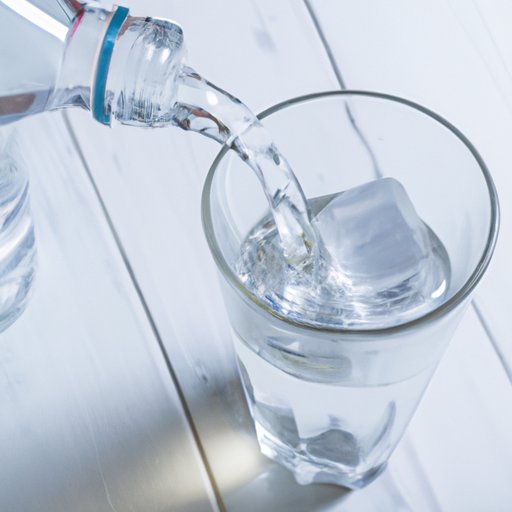
Introduction
Drinking saltwater is often thought of as a way to quench thirst in emergency situations, but it can actually be extremely dangerous for your health. In this article, we’ll examine the science behind why the body can’t handle saltwater, explore various techniques for extracting safe drinking water from saltwater, debunk some common myths about drinking saltwater, and discuss the serious consequences of ignoring the warning signs.
The Science of Drinking Saltwater: Why Your Body Can’t Handle It
Saltwater is exactly what it sounds like – water that is loaded with salt. While your body does need some salt to function, it’s designed to operate on freshwater instead. When you drink saltwater, the extra salt will dehydrate your body rather than quench your thirst. The kidneys try to remove the excess salt through urine, but in the end, you’ll end up even more dehydrated.
Drinking saltwater can also upset the delicate balance of electrolytes in your body, which can lead to cramps, dizziness, and even seizures in severe cases. In fact, the more salt you consume, the harder your kidneys have to work and the more water they will pull from your body to try and flush out the excess salt. This is why drinking saltwater can actually lead to death by dehydration if not addressed quickly.
Survival Techniques: How to Extract Safe Drinking Water from Saltwater
While drinking saltwater is never advisable, there are a few techniques that can be used to extract safe drinking water from saltwater.
One of the most common methods is distillation. This involves heating saltwater until it evaporates, then capturing the resulting steam and condensing it back into freshwater. This process removes all salt, minerals, and other impurities from the water, making it safe to drink. However, distillation is a slow and energy-intensive process, so it’s not ideal for emergency situations.
Another common technique is reverse osmosis. This involves forcing saltwater through a semi-permeable membrane that separates the salt from the water, leaving behind freshwater. This technique is faster than distillation and requires less energy, but it’s still not as efficient as other methods.
In addition to these techniques, there are other ways of extracting freshwater from saltwater such as using solar stills, water filters or desalination plants, but these methods may not be practical in a survival situation.
It’s important to note that these techniques are not foolproof, and they involve technical knowledge, materials, and time that might not always be available to the average person. Therefore, it is highly recommended that in emergency situations, you rely on well-purified and safe drinking water sources.
Exploring Alternative Sources of Drinking Water: Why Saltwater is Not the Answer
There are many other sources of safe drinking water that should be considered before resorting to drinking saltwater. For example, rainwater, groundwater, and even snow and ice can be a source of potable water in some areas.
However, it’s important to be cautious with these alternative sources as well. Rainwater collected from polluted areas, for example, might contain harmful chemicals or bacteria. Groundwater can often contain high levels of minerals or contaminants that may cause health concerns. It’s essential to purify any water source before drinking it.
Busting the Myth: Why You Shouldn’t Believe Claims That Salt Water is Safe to Drink
There are many myths floating around the internet claiming that saltwater is safe to drink, but these claims are not true. Some people suggest that the human body can adapt to drinking saltwater over time, but this is flat out wrong.
As mentioned earlier, drinking saltwater is harmful to the body and can lead to dehydration and organ failure. In fact, in many parts of the world where freshwater is scarce, drinking saltwater is a last resort that is often associated with severe health issues and even death.
The Consequences of Drinking Saltwater: What Happens to Your Body When You Ignore the Warning Signs?
Drinking saltwater can lead to several serious consequences, including dehydration, seizures, swelling of the brain, and even death. Some of the warning signs of saltwater poisoning include a dry mouth, increased thirst, fatigue, weakness, and even confusion.
If left untreated, these symptoms can progress to include severe muscle cramps, delirium, and eventually organ damage. Therefore, it’s essential to keep an eye on your hydration levels in emergency situations and always prioritize safe drinking water sources.
Conclusion
Drinking saltwater is never a safe option, even in extreme situations. While there are techniques for extracting freshwater from saltwater, these methods are not always practical or reliable. Therefore, it’s crucial to prioritize safe drinking water sources, such as purified water and natural freshwater sources. By understanding the dangers of drinking saltwater and taking precautions to avoid it, you’ll be better equipped to handle any situation that comes your way.




